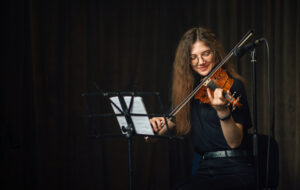
During most of my years as a violinist, performing for recitals always used to result in two ways – a fail or almost a fail. I would either have a memory slip, miss half of my shifts, play almost entirely out of tune, or do all three in one performance. This problem became typical and I never believed that I had the ability to perform flawlessly like some of my peers. I would practice phrases over and over, nailing all the notes off stage, but being on stage in front of an audience was a whole other story. Over time, I learned tips to incorporate into my practice that I love to share with my students. As you are possibly pursuing Atlanta violin lessons for yourself or your child, here are some tips that guarantee performance success.
Make A Game Plan
Since recitals are normally planned events with advanced notice, students have the opportunity to make a plan ahead of time for a solid performance. Oftentimes, students have difficulty performing their best when there is a lack of adequate preparation. Nerves and anxiousness usually pile up on performance day, but a game plan helps eliminate a great deal of problems. Don Greene in his resources, Winning On Stage, provides different game plans musicians can use to prepare for the big day. He explains the creation of short, mid, and long term goals for students and parents ranging from making simple accomplishments for the next practice day to fluent performances for each lesson. I personally love making a game-plan and this step prompts motivation to daily challenge myself.
Do Slow Practice
Slow practice is the key to playing any passage of music with clarity. The brain better processes each note, fingering, and bow stroke in slow motion to build familiarity for performance day. Sometimes, I am on stage and playing notes I never gave adequate attention to and the music suddenly feels strange. Using a metronome to moderate the slower tempos and increasing speeds little by little might be a rather “painful” experience as my students say, but the work definitely pays off in the end.
Listen To Recordings
Near the beginning of learning a piece, students should listen to a variety of the music’s recordings by different violinists. Tempo, dynamics, and all parts of interpretation are brought to light to help students see the big picture. Knowing how the piece sounds helps with the flow of the music and gives ideas for developing one’s own interpretation. I recommend only listening near the beginning of learning because I often see my students mirroring exactly what other performers do, but I always suggest listening to other music by the piece’s composer to comprehend the style and culture of the composer’s writing.
Perform 10 Play-Throughs
My violin teacher in college gave me these words of wisdom: “If you perform your piece ten times, you have developed a significant comfort with the piece”. I am not sure why she gave the number ten, but I do know the truth of this statement from my own experience. I would call my siblings and perform for them, or play the piece I am working on for my church and each play-through helped me juggle my nerves and notice parts of the music that felt uncomfortable. These play-throughs can also be recorded on a device to play-back and listen to for future practice. Some things sound different when the violin is not next to the left ear and recordings help reveal a great deal of things gone unnoticed. Try and perform these play-throughs earlier on instead of jamming them in near the performance day. This practice in the earlier stages gives time to assess and fix any problems which have occurred.
Relax On Performance Day
Relaxing is easier said than done but constantly practicing, fussing about difficult notes, and any frantic behavior does not help ease the mind for a performance. Another former teacher of mine suggested I focus on the sweet and melodious parts of the piece, sing the melody, and smile as I think of the music on performance day. I have to always remind myself that most people in the audience have no clue what I am playing and I am also sharing something special with them. Performing should be done with excellence and joy, despite the nerves. Take deep breaths, lightly stretch your body, and face the challenge with a positive spirit.
The First Step
The most critical aspect of preparing for recitals besides practicing is receiving guidance from a teacher. Each lesson provides students with insight and tools to help with their personal practice. Lessons In Your Home values the power of performance and makes goals to prepare students to play for others. Our teachers come right to your home for every lesson, plus we offer virtual music lessons, too. Our online music lessons are taught by local music teachers with live lessons tailored to your family!
By: Dana Wilson
